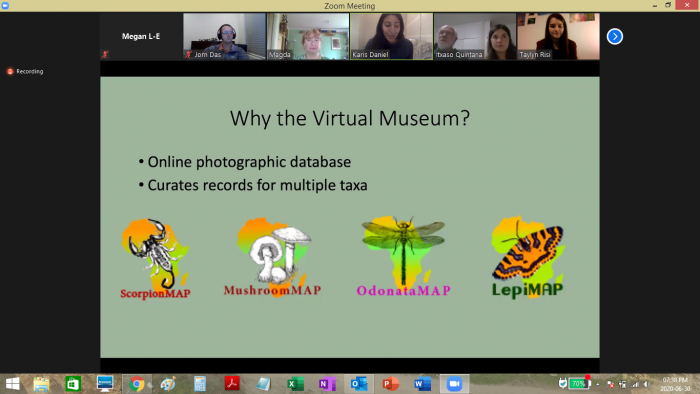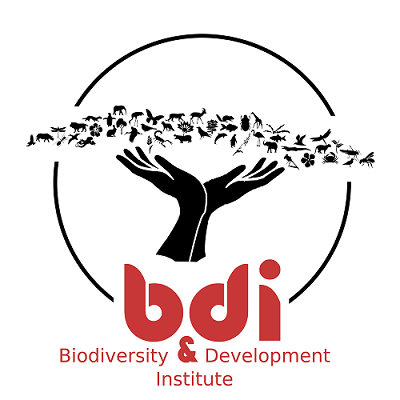Another month has flown by, here in South Africa we are still under lockdown, but that has not deterred BioMAPpers from uploading all sorts of wonderful and interesting records to the Virtual Museum. We also held our first two Virtual BioBashes via Zoom and Microsoft Teams and our first BDI Citizen Scientist Hour.
BestJune for the Virtual Museum
We have reached the middle of 2020, and are still building distribution maps. But we need to keep those maps up-to-date, so they remain relevant to conservation planning and priority setting. The RED line (graph below) shows that, for the first three months this year, totals were a bit above last year’s totals. April and May came close. But June has put us ahead again. The number of records for June (8,516) was 10% above June last year (7,734).

The total for the year-so-far is 58,601, just a little bit ahead of the total at the end of June last year (56,852). That’s 3% ahead. Given the circumstances of 2020, a 3% increase is remarkable. Please keep an eye open for the advertizing for BDI Citizen Scientist Hours and Virtual BioBashes! Thanks, Team VM, for your support.
BDI Citizen Scientist Hour
The first BDI Citizen Scientist Hour was held on Tuesday evening, 30 June, from 19:30 to 20:30 South African time. It was Zoom event, and 34 people attended from all across Africa. We had four awesome presentations:
- Karis Daniel: Why is BirdPix important right now?
- Magda Remisiewicz: What was it like doing bird ringing in Hel during lockdown?
- Sam Ivande: Why has participation by citizen scientists in the Nigerian Bird Atlas Project exceeded expectations?
- Kate Braun: What’s interesting about moths?
Karis is an MSc student at the University of Cape Town. Magda was a postdoc at UCT for three years a decade ago, and is an Associate Professor at the University of Gdansk, Poland, heading up the Bird Migration Research Station. Sam is at the University of Jos in Nigeria, linked onto the A.P Leventis Ornithological Research Institute. Kate leads several biodiversity initiatives in eSwatini (Swaziland).



This was our first “public” Zoom event. We plan to do more Citizen Science Hours, and we are also planning at least one Virtual BioBash for July 2020.
The second BDI Citizen Scientist Hour is planned for Sunday evening, 5 July, 19:30 to 20:30, Central African Time. It is a Zoom event, so you can participate without travelling. There will be an opportunity to ask questions, but we will try hard to stick within the hour:
• PC Ferreira: Why is it a good idea to submit lots of records to the Virtual Museum AND visit the Karoo Gariep Nature Reserve?
• Taylyn Risi: Are you able to help me with data collection for my MSc project?
• John Wilkinson: How did I get passionate about dragonflies and damselflies?
• Sidney Shema: What has the bird atlas project in Kenya achieved?
Once upon a time PC was just a sheep farmer in the Karoo; now he is working out how to do sheep AND biodiversity. Taylyn is an MSc student at UCT, researching moult in as many of the world’s oystercatcher species as feasible. She also sings the songs she writes. John sends tons of grapefruit, lemons and oranges all over the world from Tshipise in Limpopo. Ten years after his first encounter with a dragonfly he heads the OdonataMAP expert panel. Sidney is based in Nairobi at the Ornithology Section of the National Museums of Kenya. He is the coordinator of the Kenya Bird Map project.
Our Zoom licence is for 100 people attending an event. If you would like to be part of this, please email Itxaso Quintana itxaso@thebdi.org. She needs your name and email address. We will send you the details of how to attend a day beforehand. We plan to do more Citizen Science Hours, and we are also doing an African Virtual BioBash this month, July. The video from the First BDI Citizen Scientist Hour will go onto YouTube next week.
The Plight of the African Penguin
It has been 20 years since the “Treasure”, an iron-ore carrier, sank between Dassen Island and Robben Island off the coast of Cape Town. These penguins were ashore on Robben Island the next day (photo below). The bad news is that we can never have an oil spill on this scale again. There are simply not enough African Penguins. From around 2003 onwards, the penguin population in the Western Cape decreased. Plummeted is a better description. The problem seems to be food-related (i.e. it is not about oil). The food problem could be fishery-related or climate-change-related, or most likely a combination of both. And this makes it hard to solve. The conservation of African Penguins in their natural habitat is going to be a tough challenge.


